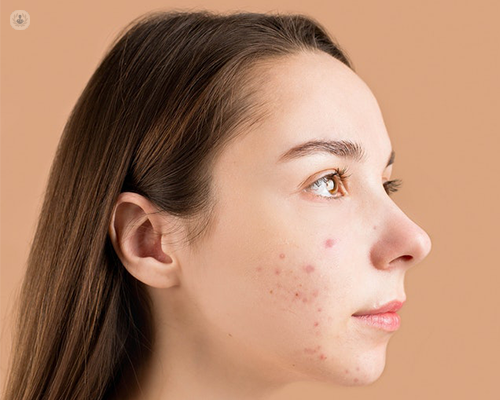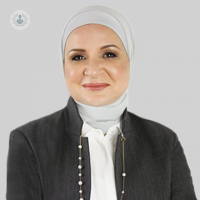Rosacea vs acne
Written by:Rosacea and acne are both conditions that lead to pimples on the face. For this reason, they are often confused for each other, which can cause numerous problems from identifying symptoms to treatment. Consultant dermatologist Dr Hiba Injibar compares these conditions and shares her expert knowledge of symptoms and treatment of rosacea.

What is rosacea?
Rosacea is an inflammatory disease of the face that mostly affects women between the ages of 25 to 55, but it can also occur in men. It consists of dilated capillaries in the cheek, sensitive and intolerant skin, and inflammation in the hair follicles causing breakouts and pimples. The appearance of rosacea is very similar to acne. Demodex folliculorum is a mite present in our skin that is implicated in causing rosacea.
Is it a type of acne?
No, it is not. The name is misleading as it is often called acne rosacea but the conditions are not related.
Can they occur at the same time?
It is extremely unlikely that these conditions will occur together, but they are often confused with one another. I often get patients who have been told they have rosacea whereas they have acne and vice versa. There are subtle signs that only experienced dermatologists can detect to help achieve proper diagnosis.
What are the symptoms of rosacea?
- Flushing (after exercise, heat exposure, emotional embarrassment, sun, alcohol intake, spicy food etc), usually in the centre of the face, at first the flushing is transitory then becomes permanent.
- Sensitive skin that stings and burn after applying many products.
- Pimples at a later stage that can have pus in them and look like acne.
- Can also affect the eyes with inflammation of the lids mostly
What are the different types of rosacea?
There are 4 main types of rosacea each with different symptoms:
- Erythematotelangiectatic rosacea – The main symptom of this type of rosacea is persistent flushing which flares up and disappears at different points.
- Papulopustular rosacea - This is the kind of rosacea which is usually misdiagnosed as acne, because pimples, commonly known as “whiteheads” are the main symptom of this kind of rosacea. They can appear on the cheeks as well as the chin and forehead.
- Rhinophyma – This type of rosacea can cause the nose to become somewhat bulbous, with large bumps and sometimes discolouration
- Ocular rosacea – This is where the eyes become affected, making them seem watery and bloodshot. In severe cases the eyes can begin to feel dry, sensitive and irritated, occasionally leading to the formation of a cyst on one of the eyelids.
How is rosacea treated?
Rosacea is generally treated by avoiding triggers such as sunlight, hairspray, spicy food, alcohol and stress. Your dermatologist may also prescribe topical prescription medication or antibiotics medications to help ease symptoms. I usually recommend that my patient use rosacea prone sensitive products such as Bioderma’s sensibio range.
For expert consultation on rosacea, acne or any other dermatological issue, why not visit Dr Hiba Injibar’s Top Doctors profile and request an appointment with her?


